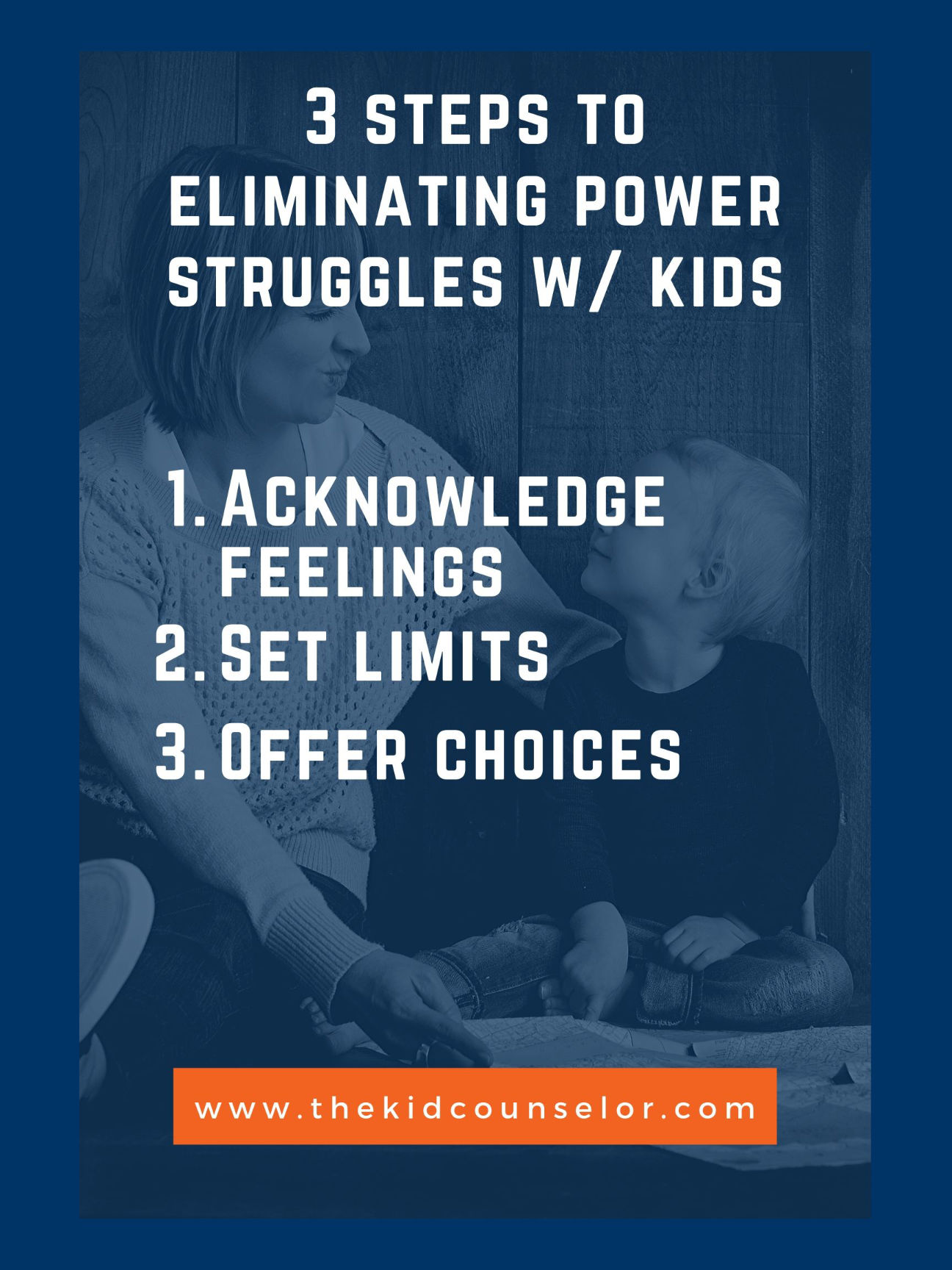Topics discussed in this episode
- The primary reason parents struggle with their children’s behavior
- Why the child struggles for power
- The single, best way to diffuse power struggles
- Examples of using choice giving to eliminate the power struggle
Transcript - click to view
Today, I want to share with you some information and insight about one of the primary reasons you might be having struggles with your child’s behavior.
One of the most consistent complaints and concerns that has brought to me at my practice when I meet with parents is that their children are disobedient. They don’t listen. They argue. They throw tantrums, they have outbursts. They have meltdowns. They refuse to just comply and agree and do what is asked of them. And one of the key realizations that will take place throughout the course of treatment when a child in a family is working with me is the parents start to make the connection that the root of almost every single piece of those experiences is a power and control struggle.
What I mean by that is we don’t often recognize how powerless our kids are and feel. Imagine being completely powerless over your circumstances. You’re told where to go, when to go, how to go, why to go. There are always expectations. There are always rules, and this is what you need to do. And there are just a constant stream and pressure of I expect you to do these things, and how you feel about it doesn’t matter.
What that does is it produces frustration, defiance and power struggle as a result. And here’s what’s incredible when parents get it. When parents start to acknowledge, I just told them what to do. They feel that their emotions about it or their thoughts about it don’t matter. So they’re trying to take back some control when they feel they don’t have any.
As soon as that connection is made, the power struggles begin to lesson and eventually reduce and go away because what children want is to have a measure of control. And all you have to do as an adult in a child’s life is to make sure that they’re given measures of control.
And I can already feel the questions coming. Well, Brenna, what does that look like?
How can you possibly give a kid control when they’re five years old and they want to run out in the road? And they can’t? Because that’s a safety issue.
The beauty of returning power and control to kids is that you can use the process called Choice Giving.
What that means is they are given choices so that they feel that they have some power. But the choices are determined by you, so it’s not free rein. Do whatever you want.
You get to decide everything that happens, but they’re given an appropriate choice.
So the child wants to run ahead in the parking lot, and you preemptively say, I know that you’re excited to go into the store, but the parking lot isn’t safe for you to run in. That’s the limit setting process.
So if you’re familiar with the 4 Pillars of Play Therapy, what I just did was the first two steps of Limit Setting, then the third piece is the Choice Giving.
So then let me backtrack so that you’re on track with me. I know that you’re excited to go into the store (acknowledgment of feeling), but the parking lot isn’t safe to run in (limit). Offer the choice. Here’s where the power differential shifts. You can choose to walk next to me, or you can choose to hold my hand. Which do you choose?
Notice that with either choice, the child stays safe, which was the goal. And so the boundaries and the parameters were already set. You can choose to walk next to me, or you can choose to hold my hand. You’re okay with either. So you still have control over him being safe in a parking lot. But all of a sudden, the child has given the power to say, Oh, do I wanna walk or do I want to hold someone’s hand? But they get to decide, and it still keeps them safe, but it reduces the power struggle.
Power differential is probably the most underrecognized and over exaggerated struggle that parents and kids have. I see it all day, every day. Parent wants something. Child wants something else, and they’re going to power struggle over it.
The immediate, easy solution to that is providing choices so that power and control is returned to the child. Kids are faced with very few things over which they have control, and often it’s bathroom habits, eating habits, sleeping habits, obedience and compliance.
That’s about the end of their list, so you can see when you tell me to do something, I’m going to say no, because I’m power struggling with you. But all of a sudden, if it’s do you choose to do your homework? As soon as you get home from school, where do you choose to do it after dinner? Which do you choose?
Homework is still getting done, whereas before, homework might have been a huge fight. Do your homework. I don’t want to. You have to know. I’m gonna go outside and play. No, you can’t go outside and play. I told you to do your homework. You’re not doing anything until your homework’s done. I’m not doing it. I hate homework. That’s how it goes. It escalates, and it just becomes this big power struggle.
But all of a sudden, now when do you choose to do your homework? Is the shift and the child has a measure of control? Well, I would much rather do it right away so that I can go outside and play or I want to go play now, and I want to be able to do my homework after dinner. That would be awesome.
So the power struggle, the power differential and returning power to your kids is a huge source of encouragement. It’s a huge relief in the power struggle that often takes place between adults and kids, so I hope you find that helpful.
Please make sure that you’re giving your Children choices when you’re able to do so. Please make sure that you’re acknowledging what they feel that will also help eliminate that power struggle. But more than anything else recognize that if you’re having struggle with your Children and their behavior, it’s probably rooted in that power and control hungry child that has been birthed out of feeling like they’re powerless a lot of the time.
So easy solution. Give them a little bit more control by giving them choices, and you should see a huge difference.
Thanks so much for watching. Talk to you soon!
Rate, Review, & Subscribe in Apple Podcast
‘Dr. Brenna gives great parenting tips!’ <– If that sounds like something you’d say, please consider rating and reviewing my show! Your ratings and reviews helps my podcast reach more people, inspiring them to build better relationships with their kids. Click here, (you need to be in your Apple Podcast app) scroll to the bottom, tap to rate with five stars, and select “Write a Review.” Then be sure to let me know what you thought about the episode!
Also, if you haven’t done so already, subscribe to the podcast. I periodically add bonus episodes to the feed and, if you’re not subscribed, there’s a good chance you’ll miss out. Subscribe now!


